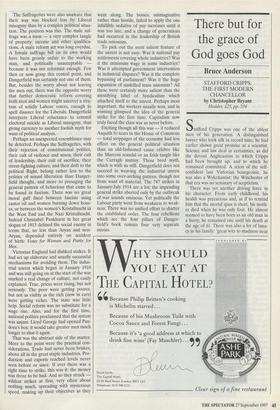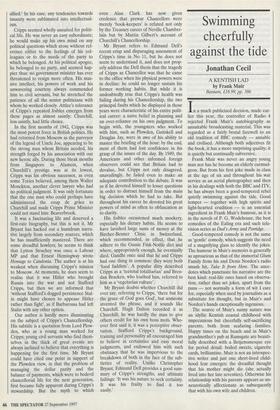There but for the grace of God goes God
Bruce Anderson
STAFFORD CRIPPS: THE FIRST MODERN CHANCELLOR by Christopher Bryant Hodder, £25, pp. 534 Stafford Cripps was one of the ablest men of his generation. A distinguished lawyer who took silk in record time, he had earlier shown great promise as a scientist. Science and law deal in certainties, as did the devout Anglicanism in which Cripps had been brought up, and to which he remained committed. A scion of the self- confident late Victorian bourgeoisie, he was also a Wykehamist: the Winchester of that era was no seminary of scepticism.
There was yet another driving force in his character. From early childhood, his health was precarious and, as if to remind him that the mortal span is short, his moth- er died when he was only four. He almost seemed to have been born as an old man in a hurry; he remained one until his death at the age of 61. There was also a lot of luna- cy in his family: 'great wits to madness near allied.' In his case, any tendencies towards insanity were sublimated into intellectual- ism.
Cripps seemed wholly unsuited for politi- cal life. He was never an easy subordinate; he would make up his own mind on any political questions which arose without ref- erence either to the feelings of his col- leagues or to the needs of the party to which he belonged. At his political apogee, he belonged to no party, and seemed hap- pier thus: no government minister has ever threatened to resign more often. His mas- sive intellect, his powers of work and his unwavering courtesy always commended him to civil servants, but he stretched the patience of all the senior politicians with whom he worked closely. Attlee's tolerance of Cripps's repeated foibles emerges from these pages as almost saintly; Churchill, less saintly, had little choice.
In the first months of 1942, Cripps was the most potent force in British politics. He had returned from Moscow as the purveyor of the legend of Uncle Joe, appearing to be the strong man whom Britain needed, his strength forged by his association with our new heroic ally. During those bleak months from Singapore to Alamein, when Churchill's prestige was at its lowest, Cripps was his obvious successor, as even some Tories believed, among them Walter Monckton, another clever lawyer who had no political judgment. It was only fortunate that the one man who could perhaps have administered the coup de grace to Churchill and made Cripps Prime Minister could not stand him: Beaverbrook.
It was a fascinating life and deserved a first-rate biography, but this is not it. Mr Bryant has hacked out a humdrum narra- tive largely from secondary sources, which he has insufficiently mastered. There are some dreadful howlers; he seems to think that Lytton Strachey was once a Labour MP and that Ernest Hemingway wrote Homage to Catalonia. The author is at his weakest when discussing Cripps's mission to Moscow. At moments, he does seem to realise that it was Hitler who brought Russia into the war and not Stafford Cripps, but then we are informed that `without Stafford's dogged persistence Stal- in might have chosen to appease Hitler rather than fight', as if Barbarossa had left Stalin with any other option.
Our author is hardly more illuminating on the subject of Cripps's Chancellorship. His subtitle is a quotation from Lord Plow- den, who as a young man worked for Cripps; young civil servants who find them- selves in the thick of great events are always inclined to believe that everything is happening for the first time. Mr Bryant could have cited one point in support of the Plowden view, in that the problem of managing the dollar parity and the balance of payments, which were to bedevil chancellorial life for the next generation, first became fully apparent during Cripps's stewardship. But the myth to which even Alan Clark has now given credence that prewar Chancellors were merely 'book-keepers' is refuted not only by the Treasury career of Neville Chamber- lain but by Martin Gilbert's account of Churchill's Chancellorship.
Mr Bryant refers to Edmund Dell's recent crisp and disparaging assessment of Cripps's time in No 11, but he does not seem to understand it, and does not prop- erly address the Dell thesis that the tragedy of Cripps as Chancellor was that he came to the office when his physical powers were in decline: he could no longer sustain his former working habits. But while it is undoubtedly true that Cripps's health was failing during his Chancellorship, the two principal faults which he displayed in those years were characteristic of his entire polit- ical career: a naive belief in planning and an over-reliance on his own judgment. To begin with, the youngsters who worked with him, such as Plowden, Gaitskell and Douglas Jay, were in awe of his ability to master the briefing of the hour: by the end, most of them had lost confidence in his grasp of the issues of the day. By 1949, the Americans and other informed foreign observers could see that Britain had to devalue, but Cripps not only disagreed, unavailingly, he failed even to make an adequate contribution to the debate. It was as if he devoted himself to lesser questions in order to distract himself from the main big decision which he had to take. But throughout his career he devoted his great powers of mind as often to obfuscation as to clarity.
His foibles occasioned much mockery, especially his dietary habits. He seems to have lavished large sums of money at the Bircher-Benner Clinic in Switzerland, which recommended, in effect, that he adhere to the Gussie Fink-Nottle diet and where, appropriately enough, he eventually died. Gandhi once said that he and Cripps had one thing in common: they were both `food faddists'. A popular ditty described Cripps as a 'teetotal totalitarian' and Bren- dan Bracken, who loathed him, referred to him as a 'vegetarian vulture'.
Mr Bryant doubts whether Churchill did ever say, referring to Cripps, 'there but for the grace of God goes God', but someone invented the phrase, and it sounds like Churchill. Hugh Dalton recorded it as Churchill; he was hardly the man to give others credit for his own bons mots. Who- ever first said it, it was a perceptive obser- vation. Stafford Cripps's background, training and personality all encouraged him to believe in certainties and easy moral judgments, and endowed him with such obstinacy that he was impervious to the breakdown of both in the face of the sub- tleties of reality. Unlike Christopher Bryant, Edmund Dell provides a good sum- mary of Cripps's strengths, and ultimate failings: 'It was his nature to seek certainty. It was his frailty to find it too easily.'











































































 Previous page
Previous page